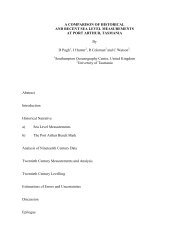Annual report 2005-06.indd - Antarctic Climate and Ecosystems ...
Annual report 2005-06.indd - Antarctic Climate and Ecosystems ...
Annual report 2005-06.indd - Antarctic Climate and Ecosystems ...
Create successful ePaper yourself
Turn your PDF publications into a flip-book with our unique Google optimized e-Paper software.
antarctic marine ecosystemsProgram LeaderDr Andrew ConstableAustralian <strong>Antarctic</strong> DivisionThe Southern Ocean, in particular thecoastal region around <strong>Antarctic</strong>a, hostsa vast <strong>and</strong> complex marine ecosystemthat supports the fisheries of Australia<strong>and</strong> several other nations. This importantregion is internationally acknowledged asregion of great ecological importance, butit remains relatively under-sampled <strong>and</strong>poorly understood.The ACE CRC <strong>Antarctic</strong> Marine<strong>Ecosystems</strong> Program is exploringrelationships among the biologicalpatterns <strong>and</strong> processes of the marineecosystem around East <strong>Antarctic</strong>a <strong>and</strong>relating them to physical oceanographicprocesses. This knowledge will help guideAustralian government <strong>and</strong> industrydecision-makers in the formulation ofpolicy <strong>and</strong> management strategies inresponse to harvest of some resources<strong>and</strong> to future climate change.Program Objectives• To identify how biological productivityis affected by sea ice extent <strong>and</strong>properties, <strong>and</strong> by ocean circulation.Productivity in the Southern Ocean hasbeen linked to the winter sea ice cover <strong>and</strong>to large-scale ocean circulation patterns,both of which are sensitive to climatechange. ACE CRC researchers are combiningoceanographic data, satellite data <strong>and</strong> ship-based observations with historical data fromice <strong>and</strong> sediment cores, penguin rookeries<strong>and</strong> operational records. They will use thisdata to test the hypothesis that reduced seaice extent due to climate warming or otherfactors will lead to a smaller sea ice algalcommunity <strong>and</strong> to explore what impactssuch changes would have further up the foodchain.• To quantify <strong>and</strong> describe processes thatlink sea ice, <strong>and</strong> primary <strong>and</strong> secondaryproductivity. The linkage between thephysical environment <strong>and</strong> the <strong>Antarctic</strong>marine food web is poorly understood atpresent. ACE CRC research will result inmodels of the small scale processes linkingthe physical <strong>and</strong> biological components ofthe system. The models will be used as thebasis for predicting the impacts of physical orbiological changes on the overall function ofthe <strong>Antarctic</strong> marine ecosystem.• To project the effects of long-termchange on <strong>Antarctic</strong> ecosystems. The<strong>Antarctic</strong> environment is highly variable inspace <strong>and</strong> time. We need to account for thisvariation in ecosystem processes in order todevelop accurate predictive models for theSouthern Ocean. We also need improvedmodels to predict how local changes causedby climate change <strong>and</strong> fisheries might impactthe greater ecosystem. ACE CRC scientistsare using remote sensing of ocean colour<strong>and</strong> water movements, as well as field-basedoceanographic <strong>and</strong> biological measurements,to improve our abilities to accurately modelthe effects of ocean circulation <strong>and</strong> sea ice onbiological productivity.• To translate predictions of the effectsof climate change on SouthernOcean ecosystems into sustainablemanagement models. A combination36 <strong>Antarctic</strong> <strong>Climate</strong> & <strong>Ecosystems</strong> CRC - <strong>Annual</strong> Report <strong>2005</strong>-06








